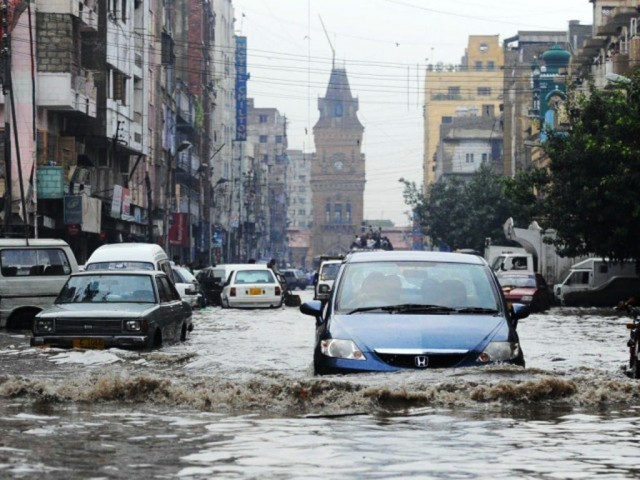Traffic police frazzled at criticism for tarffic jams during rainfall
Paralysis on the roads could have been prevented with a few wise decisions.

Ahmed was on his way when the downpour and the subsequent traffic jam began. He was lucky that a kind-hearted CNG station owner gave him shelter in his office on MA Jinnah Road. “I wonder what would happen if, God forbid, an actual flood hit the city,” said Ahmed.
An information technology specialist, Ali Islam, 31, left Clifton, on Saturday afternoon. He also reached his house in Gulshan-e-Iqbal the next day. “I literally had tears in my eyes by the time I saw my house,” said Islam.
The traffic police in the city has borne the brunt of criticism in the aftermath of the massive gridlock on almost every main thoroughfare of the city after Saturday’s rain. But is the hatred directed at the right quarters?
The deputy inspector general (DIG) of traffic police, Khurram Gulzar, was visibly distressed at being blamed for the river-like flow on the roads. “People are blaming me as if I’m the one who caused the rains,” he exclaimed.
Gulzar commands a force of 3,000 men, half of them work in the day and the other half works at night. They are responsible for keeping a smooth flow of traffic on the city’s 30,000 kilometre long roads and 600 roundabouts. “With such a small number of men under my command, it is not possible to place them at every nook and corner,” he snapped, while responding to the criticism that his men were nowhere to be seen.
“No one listens to us,” he said. “Half of the problems are caused by impatient drivers who won’t hesitate to drive on the wrong side for a shortcut.” He asked why the traffic police are blamed when the Water and Sewarage Board (KWSB) and the City District Government Karachi (CDGK) are responsible for keeping the roads dry.
According to the emergency traffic plan, when there is something wrong with II Chundrigar Road traffic should be diverted to MA Jinnah Road, similarly if there’s a problem on Shahra-e-Qaideen then the vehicles are diverted to Tariq Road and if there is a jam on Shahrae Faisal, then the Karsaz Road is supposed to ease the pressure. “But if all thoroughfares are flooded at the same time, there is nothing much that can be done,” explained the DIG.
Another problem is that 80% of the vehicles in Karachi run on CNG, which are more susceptible to breakdown during rain. On top of that most of the cars don’t even have a protective pipe over their silencers. Hence, the cars shut down in the middle of the roads when water enters their engines.
But the fact of the matter is that on Saturday, gridlocks in some areas could have been prevented if traffic authorities had acted wisely. For example ,at the Metropole intersection, if the road coming from Avari had been closed, traffic flow towards Clifton, PIDC and the Governor House could have been eased. “You are right,” admitted the DIG. “But shutting down one road creates congestion on others,” he insisted.
When asked if there is any hope that the situation may improve in the future, Gulzar just shook his head. He asked how can it happen when there is an insane number of vehicles plying on the roads every day.
Published in The Express Tribune, September 12th, 2011.



















COMMENTS
Comments are moderated and generally will be posted if they are on-topic and not abusive.
For more information, please see our Comments FAQ